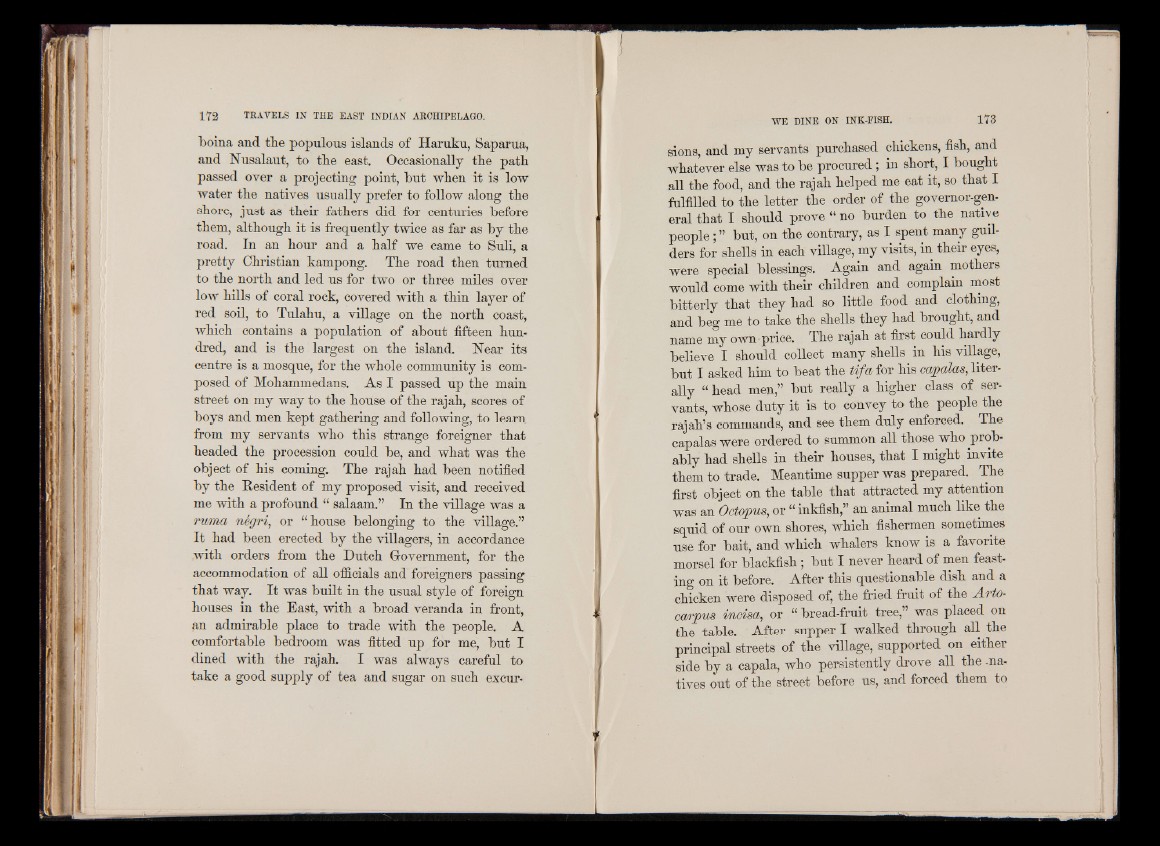
boina and the populous islands of Haruku, Saparua,
and Nusalaut, to the east. Occasionally the path
passed over a projecting point, but when it is low
water the natives usually prefer to follow along the
shore, just as their fathers did for centuries before
them, although it is frequently twice as far as by the
road. In an hour and a half we came to Suli, a
pretty Christian kampong. The road then turned
to the north and led us for two or three miles over
low hills of coral rock, covered with a thin layer of
red soil, to Tulahu, a village on the north coast,
which contains a population of about fifteen hundred,
and is the largest on the island. Hear its
centre is a mosque, for the whole community is composed
of Mohammedans. As I passed up the main
street on my way to the house of the rajah, scores of
boys and men kept gathering and following, to learn
from my servants who this strange foreigner that
headed the procession could be, and what was the
object of his coming. The rajah had been notified
by the Resident of my proposed visit, and received
me with a profound “ salaam.” In the village was a
rvma negri, or “ house belonging to the village.”
It had been erected by the villagers, in accordance
with orders from the Dutch Government, for the
accommodation of all officials and foreigners passing
that way. It was built in the usual style of foreign
houses in the East, with a broad veranda in front,
an admirable place to trade with the people. A
comfortable bedroom was fitted up for me, but I
dined with the rajah. I was always careful to
take a good supply of tea and sugar on such excursions,
and my servants purchased chickens, fish, and
whatever else was to be procured; in short, I bought
all the food, and the rajah helped me eat it, so that I
fulfilled to the letter the order of the governor-general
that I should prove “ no burden to the native
people ; ” but, on the contrary, as I spent many guilders
for shells in each village, my visits, in their eyes,
were special blessings. Again and again mothers
would come with their children and complain most
bitterly that they had so little food and clothing,
and beg me to take the shells they had brought, and
name my own price. The rajah at first could hardly
believe I should collect many shells in his village,
but I asked bim to beat the tifa for his capalas, literally
“ head men,” but really a higher class of servants,
whose duty it is to convey to the people the
rajah’s commands, and see them duly enforced. The
capalas were ordered to summon all those who probably
had shells in their houses, that I might invite
them to trade. Meantime supper was prepared. The
first object on the table that attracted my attention
was an Octopus, or “ inkfish,” an animal much like the
squid of our own shores, which fishermen sometimes
use for bait, and which whalers know is a favorite
morsel for blackfish ; but I never heard of men feasting
on it before. After this questionable dish and a
chicken were disposed of, the fried fruit of the Arto-
co/rpus incisa, or “ bread-fruit tree,’ was placed on
the table. After supper I walked through all the
principal streets of the village, supported on either
side by a capala, who persistently drove all the -natives
out of the street before us, and forced them to